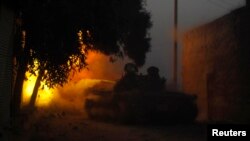BEIRUT, LEBANON —
Syrian army helicopters bombarded the northern rebel-held town of Al-Bab for a second day on Sunday, killing 20 people including four women when they dropped improvised barrel bombs on a market district, a monitoring group said.
The Syrian Observatory for Human Rights said the death toll could rise because many people were severely wounded in the raid, which came a day after 26 people were killed in a similar attack on the same town by President Bashar al-Assad's forces.
The British-based Observatory said three rebels from the Tawhid Brigade were killed in Saturday's raid, which appeared to target their headquarters in Al-Bab.
Sunday's attack may have been aimed at another rebel group, it said. However, barrel bombs - explosive-filled cylinders or oil barrels - are usually rolled out of the back of helicopters and are rarely delivered with any accuracy.
The Observatory said 212 people were killed across Syria on Saturday, bringing the death toll since Thursday to over 600.
There is little sign that diplomacy will end the conflict and the fighting has, if anything, escalated since the United Nations announced on Monday that a long-delayed peace conference would be held in Geneva on Jan. 22.
Video uploaded onto the Internet by activists in Al-Bab showed concrete fragments scattered over a street next to a destroyed building. In another, wires hung from the grey remains of a building, spilling onto the road.
The state news agency SANA said the army had destroyed "several terrorist dens" including the headquarters of one Islamist group.
The bombardment of Al-Bab, around 40 km (25 miles) north-east of the divided city of Aleppo, follows gains by Assad's forces on Aleppo's south-east approaches last month and could herald a similar ground offensive in the area.
It comes at a time of heavy fighting across the country, particularly around Aleppo, in the Qalamoun region which overlooks the main highway north from Damascus, and the eastern suburbs of the capital.
More than 100,000 people have been killed in the 2-1/2 year conflict, which has split the Middle East. Sunni Muslim powers such as Gulf Arab states and Turkey support the Sunni rebels, while Shi'ite Iran backs the Alawite president.
Since rebels threatened Damascus late last year, Assad has been consolidating his military power around the capital and in the center of the country. His forces recaptured the town of Deir Attiyah on Thursday and have been trying to push rebels out of Nabak, which lies on the Damascus-Homs road.
The Observatory said a suicide bomber blew up a car at a police building near Nabak on Saturday night, killing five members of Assad's security forces.
State news agency SANA said rebel attacks on a gas pipeline linking Homs to the eastern energy-producing region of Deir al-Zor, and another attack on a gas field north of Palmyra, had halted a daily supply of 5.5 million cubic meters of gas.
It said the attacks would lead to a drop in fuel supply to electricity generating stations and an increase in electricity consumption rationing.
The Syrian Observatory for Human Rights said the death toll could rise because many people were severely wounded in the raid, which came a day after 26 people were killed in a similar attack on the same town by President Bashar al-Assad's forces.
The British-based Observatory said three rebels from the Tawhid Brigade were killed in Saturday's raid, which appeared to target their headquarters in Al-Bab.
Sunday's attack may have been aimed at another rebel group, it said. However, barrel bombs - explosive-filled cylinders or oil barrels - are usually rolled out of the back of helicopters and are rarely delivered with any accuracy.
The Observatory said 212 people were killed across Syria on Saturday, bringing the death toll since Thursday to over 600.
There is little sign that diplomacy will end the conflict and the fighting has, if anything, escalated since the United Nations announced on Monday that a long-delayed peace conference would be held in Geneva on Jan. 22.
Video uploaded onto the Internet by activists in Al-Bab showed concrete fragments scattered over a street next to a destroyed building. In another, wires hung from the grey remains of a building, spilling onto the road.
The state news agency SANA said the army had destroyed "several terrorist dens" including the headquarters of one Islamist group.
The bombardment of Al-Bab, around 40 km (25 miles) north-east of the divided city of Aleppo, follows gains by Assad's forces on Aleppo's south-east approaches last month and could herald a similar ground offensive in the area.
It comes at a time of heavy fighting across the country, particularly around Aleppo, in the Qalamoun region which overlooks the main highway north from Damascus, and the eastern suburbs of the capital.
More than 100,000 people have been killed in the 2-1/2 year conflict, which has split the Middle East. Sunni Muslim powers such as Gulf Arab states and Turkey support the Sunni rebels, while Shi'ite Iran backs the Alawite president.
Since rebels threatened Damascus late last year, Assad has been consolidating his military power around the capital and in the center of the country. His forces recaptured the town of Deir Attiyah on Thursday and have been trying to push rebels out of Nabak, which lies on the Damascus-Homs road.
The Observatory said a suicide bomber blew up a car at a police building near Nabak on Saturday night, killing five members of Assad's security forces.
State news agency SANA said rebel attacks on a gas pipeline linking Homs to the eastern energy-producing region of Deir al-Zor, and another attack on a gas field north of Palmyra, had halted a daily supply of 5.5 million cubic meters of gas.
It said the attacks would lead to a drop in fuel supply to electricity generating stations and an increase in electricity consumption rationing.





